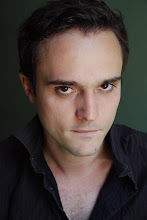Plot: An astronaut just returned from space is nearly driven mad when all traces and memories of his fellow astronaut seem to vanish. Soon he follows suit.

Rod Taylor really carries this piece on his shoulders. His delivery and expressions seem genuine in his given situation, sullied only briefly when he walks directly through a plate-glass door with very little effort and no negative side effects. Who could have guessed that within four years he would play the leading man in both The Time Machine and Alfred Hitchcock's The Birds. At 80, he still gets in front of the camera on occasion, most recently playing Winston Churchill in Inglourious Basterds. He was also a recurring character in Walker, Texas Ranger, a show which really deserves its own blog...

One effect that didn't go over well was where Taylor is supposed to be looking in a mirror but not seeing his reflection. It probably looked fine on television sets which overscan so that not all of the sides are visible, but I watched it on my computer which displays all of the data on the disc, so I could clearly see part of his arm in the frame. A sloppy mistake that probably went unnoticed until long after the set was torn down and the actors had departed. Time to call in George Lucas for a digital touch-up.
Hands down my favorite episode title. "And When The Sky Was Opened": it's so elusive, like a phrase plucked from the middle of a sentence. What happened then, and what happened before? That's really the questions you're left with after watching this episode, and at first I felt cheated. No explanation for the disappearance of the three astronauts is offered or even hinted at. In the beginning it's mentioned that they seemed to have disappeared for 24 hours prior to their crash landing on Earth; that, too, is never touched on again. Serling's reasoning was that the rest of the story was so spooky that any ending tacked-on would have been overshadowed. I disagreed until I read what Zicree had to say about it in The Twilight Zone Companion:
"... the episode was made in a different era. We know that when astronauts go into space they don't cease to exist – we've done it. But when Serling wrote the script, no one could be certain what would happen when men first ventured into space. In his script, he was trying to capture that dread of the unknown..."
That was my error: I forgot to consider the Zeitgeist. In a show packed with dialing for the operator, 30 cent beers, sending telegrams, and smoking cigarettes, I forgot that this was a decade before manned space exploration. Much like last week's episode, the spirit of the time plays a large part in being able to relate to the material.
Sometimes when I'm reading The Twilight Zone Companion I feel like I'm back in an English class, with Zicree telling me exactly what to think about each installment. Unlike the bulk of my English classes, though, I never have to shake my fist at him, arguing that not every story is a parable for the life of Jesus. Do they just hand out English degrees?

Back to the point, considering that space travel probably seemed like a pipe dream to 1959 audiences, I see how the ending works now. Taylor's euphoric expression just prior to his disappearance makes me think of a sublimation into heaven, or nirvana. Still, I would have solidified the idea with an extra line, something like, "I see it now. We were never meant to leave the Earth. This is our place; this is!" But alas, I'm not the writer.
Yet.

No comments:
Post a Comment